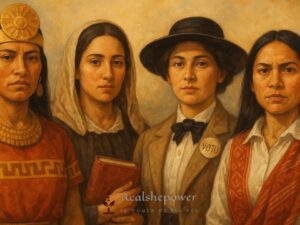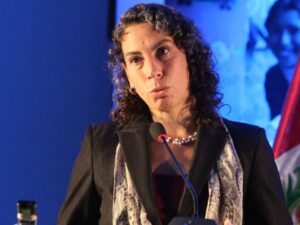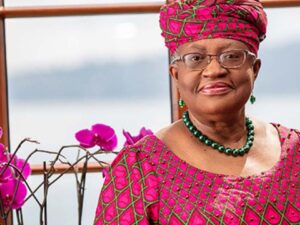When Claudia Sheinbaum was sworn in as Mexico’s first female president on October 1, 2024, the moment wasn’t just a milestone for her—it was a seismic shift for women in politics everywhere. For over 200 years, Mexico, like many nations, had been led exclusively by men. Then came Sheinbaum, a scientist, a leftist, and a former Mexico City mayor, breaking the glass ceiling with a landslide victory that captured nearly 60% of the vote. Her story is one of resilience, intellect, and an unyielding commitment to social justice, making her a beacon of women empowerment and a true embodiment of #RealShePower.
In this article, we’ll dive deep into Claudia Sheinbaum’s life, her rise to power, and what her presidency means for trailblazing women in politics. We’ll explore her background, her policies, and the challenges she faces, all while keeping it real and relatable. Whether you’re curious about her journey or seeking inspiration from a woman rewriting history, let’s unpack why Sheinbaum’s story resonates globally.
- Who Is Claudia Sheinbaum? A Snapshot of a Trailblazer
- Early Life of Claudia Sheinbaum: Roots of Resilience
- Entering the Political Arena: A Scientist in a New World
- The Road to the Presidency: A Historic Victory
- Why Claudia Sheinbaum Matters for Women in Politics
- Challenges Ahead: Leading Mexico in Turbulent Times
- Sheinbaum’s Vision: A New Era of Mexican Humanism
- The Feminist Debate: Is Claudia Sheinbaum a Feminist Icon
- Global Impact: A Light in Dark Times
- Lessons from Claudia Sheinbaum’s Journey
- The Future of #RealShePower in Mexico and Beyond
Who Is Claudia Sheinbaum? A Snapshot of a Trailblazer
Born on June 24, 1962, in Mexico City, Claudia Sheinbaum Pardo grew up in a family that valued education and activism. Her parents, both scientists, were active in Mexico’s left-wing movements during the 1960s, instilling in her a passion for justice and equality. Sheinbaum wasn’t just another politician climbing the ranks—she was a physicist with a Ph.D. in energy engineering, a climate scientist who contributed to the Intergovernmental Panel on Climate Change (IPCC), which won the Nobel Peace Prize in 2007. Talk about credentials!
But Sheinbaum’s story isn’t just about academic accolades. She’s a mother, a grandmother, and someone who’s navigated the rough waters of Mexican politics with a data-driven mindset and a heart for the people. Her journey from student activist to Mexico’s 66th president is a masterclass in perseverance, making her a standout among women in politics.
Early Life of Claudia Sheinbaum: Roots of Resilience

Sheinbaum’s upbringing was steeped in intellectual curiosity and social consciousness. Her father, Carlos Sheinbaum Yoselevitz, was a chemist of Ashkenazi Jewish descent, while her mother, Annie Pardo Cemo, a biologist, came from a Sephardi Jewish family that fled persecution in Bulgaria during World War II. Growing up in a secular Jewish household, Sheinbaum was exposed to progressive ideas early on. Her parents’ involvement in the 1968 student protests left a lasting mark, shaping her belief that change starts with the people.
As a student at the National Autonomous University of Mexico (UNAM), Sheinbaum studied physics, later earning a master’s and doctorate in energy engineering. Between 1991 and 1994, she conducted research at the Lawrence Berkeley National Laboratory in California, analyzing energy use in Mexico’s transportation and building sectors. This period wasn’t just about science—it was where she honed her ability to tackle complex problems with precision, a skill she’d later bring to politics.
Entering the Political Arena: A Scientist in a New World

Sheinbaum’s political journey began in 2000 when Andrés Manuel López Obrador (AMLO), then head of government for Mexico City, appointed her as the city’s secretary of the environment. This was no small role—Mexico City, one of the world’s largest urban centers, faced massive environmental challenges. Sheinbaum spearheaded initiatives like the Metrobús, a bus rapid transit system, and the expansion of the city’s outer beltway, proving she could translate scientific rigor into practical solutions.
Her time as environment secretary was just the start. Sheinbaum stayed close to AMLO, helping found the Morena party (National Regeneration Movement) in 2014. By 2015, she was elected mayor of Tlalpan, one of Mexico City’s largest boroughs. Her tenure wasn’t without controversy—a school collapse during the 2017 earthquake killed 26 people, drawing criticism. But Sheinbaum pushed forward, learning from setbacks and focusing on governance that prioritized the marginalized.
In 2018, she made history again as the first woman elected mayor of Mexico City. Her data-driven approach slashed the city’s murder rate by half, bolstered police funding, and expanded public transit. She also championed progressive causes, like gender-neutral school uniforms and clean energy initiatives, cementing her reputation as a leader who walked the talk on women empowerment.
The Road to the Presidency: A Historic Victory
By 2023, Sheinbaum was ready for the biggest stage yet. She resigned as Mexico City mayor to seek Morena’s presidential nomination for the 2024 election. Facing stiff competition, including former foreign secretary Marcelo Ebrard, she clinched the nomination with her disciplined campaign and AMLO’s endorsement. Her opponent, Xóchitl Gálvez, represented a coalition of opposition parties, but Sheinbaum’s message of continuity and progress resonated deeply.
On June 2, 2024, Mexico went to the polls in its largest election ever, filling over 20,000 positions. Sheinbaum won in a landslide, securing nearly 60% of the vote—more than AMLO’s 2018 tally. Her victory wasn’t just historic for being Mexico’s first female president; she also became the first Jewish leader of a predominantly Catholic nation.
As she declared in her victory speech, “For the first time in 200 years of the Republic, I will become the first woman president of Mexico. I am not coming alone—all of us, women, are coming.”
That’s #RealShePower in action.
Why Claudia Sheinbaum Matters for Women in Politics
Sheinbaum’s rise isn’t just a win for Mexico—it’s a global beacon for women in politics. In a world where female leaders are still the exception, her presidency challenges stereotypes and proves that women can lead with strength, intellect, and compassion. Let’s break down why she’s a game-changer for trailblazing women and women empowerment:
1. Breaking the Glass Ceiling
Mexico, like many Latin American countries, has a complex history with gender roles. Machismo culture has long shaped politics, yet Sheinbaum’s election shows progress. She joins a growing list of female leaders in the region—think Chile’s Michelle Bachelet or Costa Rica’s Laura Chinchilla—but her landslide victory signals a cultural shift. Women in politics are no longer outliers; they’re forces to be reckoned with.
2. A Role Model for #RealShePower
Sheinbaum’s story resonates because it’s relatable. She’s not a career politician born into privilege—she’s a scientist who worked her way up, balancing family and ambition. Her focus on education, healthcare, and equality speaks to women everywhere striving for a seat at the table. As she said at her inauguration, “It is time for women,” a rallying cry for anyone chasing their own #RealShePower moment.
3. Policy with a Purpose
Sheinbaum’s platform isn’t just talk—it’s rooted in action. She’s pledged to expand free healthcare, create 300,000 higher education spots, and tackle gender-based violence, a pressing issue in Mexico where femicides remain alarmingly high. Her proposal for constitutional reforms to ensure substantive equality—like closing the gender pay gap—shows she’s serious about systemic change. For women in politics, she’s proof that leadership means delivering results.
4. Navigating a Man’s World
Let’s be real: politics can be brutal, especially for women. Sheinbaum has faced skepticism, from doubts about her independence from AMLO to criticism over her handling of feminist protests as mayor. Yet she’s stayed steady, using data and dialogue to defuse tension. Her ability to thrive in a male-dominated arena is a lesson for trailblazing women everywhere: resilience is power.
Challenges Ahead: Leading Mexico in Turbulent Times
Being Mexico’s first female president comes with sky-high expectations—and no shortage of hurdles. Sheinbaum inherited a nation grappling with violence, economic strain, and international pressures. Here’s a closer look at what’s on her plate:
1. Tackling Violence and Cartels
Mexico’s homicide rate is among the world’s highest, with over 220,000 murders or disappearances during AMLO’s term. The Sinaloa Cartel’s infighting has turned cities like Culiacán into battlegrounds. Sheinbaum’s “Hugs, not Bullets” strategy, inherited from AMLO, emphasizes addressing poverty over direct confrontation. Critics argue it’s too soft, but she’s promised more intelligence work and police reform. Can she deliver? The stakes are life-or-death.
2. Gender-Based Violence
As a woman leader, Sheinbaum faces intense pressure to address femicides—around 10 women are murdered daily in Mexico. Her critics point to her silence on abortion during the campaign and her handling of feminist protests as mayor, where police clashed with activists. Yet she’s proposed reforms to protect women’s rights and reduce violence. Her October 3, 2024, announcement of constitutional changes for equality is a start, but implementation is key.
3. Economic Balancing Act
Mexico’s economy, the second-largest in Latin America, faces a 6% GDP budget deficit from AMLO’s welfare programs. Sheinbaum must maintain popular pensions and scholarships while stabilizing finances. Investors are jittery about Morena’s dominance, fearing socialist policies. Her response? A focus on clean energy and infrastructure, leveraging her scientific expertise to boost growth without alienating markets.
4. U.S. Relations and Trade
With the U.S. as Mexico’s top trading partner, Sheinbaum’s diplomacy is under scrutiny, especially with Donald Trump’s potential return in 2025. His threats of 25% tariffs on Mexican exports could disrupt the USMCA trade agreement. Sheinbaum’s already shown grit, rejecting border closures and advocating for bridges between nations. Her handling of migration and trade will shape Mexico’s global standing.
Sheinbaum’s Vision: A New Era of Mexican Humanism
At her core, Sheinbaum calls her approach “Mexican humanism,” a blend of AMLO’s “For the good of all, first the poor” ethos with her own scientific pragmatism. Her inauguration speech laid out a bold agenda:
- Healthcare for All: Consolidating a free, high-quality public health system.
- Education Access: Expanding universities and high schools to empower youth.
- Clean Energy: Accelerating Mexico’s transition to renewables, drawing on her climate expertise.
- Social Justice: Continuing welfare programs that lifted 9.5 million Mexicans out of poverty under AMLO.
Unlike AMLO’s charismatic populism, Sheinbaum’s style is measured, almost professorial. She governs with spreadsheets and studies, not soundbites. As political analyst Carlos Pérez Ricart noted, she lacks AMLO’s “chummy, everyman appeal,” but her focus on facts over flair could be her strength—or her Achilles’ heel.
The Feminist Debate: Is Claudia Sheinbaum a Feminist Icon

Sheinbaum’s presidency has sparked heated debate among feminists. Supporters see her as a symbol of women empowerment, a woman who’s shattered barriers while championing equality. Her reforms for gender parity and violence prevention are seen as steps toward substantive change. Younger generations, especially, view her as direct representation in a government long dominated by men.
But not everyone’s convinced. Some feminist groups argue she’s not vocal enough on issues like abortion, pointing to her cautious stance: “The Supreme Court has ruled on abortion, and that’s what matters.” Her approval of militarized policing, which led to clashes with protesters on March 8, 2020, drew ire. Critics also worry she’s too tied to AMLO’s legacy, which prioritized broad social programs over specific gender policies.
The truth? Sheinbaum’s feminism seems practical, not performative. She’s focused on systemic fixes—better healthcare, education, and wages—over symbolic gestures. As she put it, “Women have arrived to shape the destiny of our beautiful nation.” Whether that satisfies her critics remains to be seen.
Global Impact: A Light in Dark Times
Sheinbaum’s presidency arrives at a moment when the world feels unsteady. From Putin’s aggression to Trump’s tariff threats, strongmen dominate headlines. Yet here’s Sheinbaum, a secular Jewish scientist leading with empathy and evidence. As Mexican feminist Marta Lamas told The New York Times, “She is a light in this terrible situation we are facing.” Her 85% approval rating six months into her term speaks volumes—people see her as a steady hand.
For women in politics globally, she’s a reminder that leadership doesn’t need bravado. Her data-driven governance, commitment to the poor, and environmental focus offer a counterpoint to autocratic machismo.
Lessons from Claudia Sheinbaum’s Journey
So, what can we learn from this trailblazing woman? Whether you’re a student, a professional, or someone chasing your own #RealShePower moment, Sheinbaum’s life offers gems of wisdom:
- Lean Into Your Strengths: Sheinbaum’s scientific background isn’t a footnote—it’s her superpower. Use what makes you unique to stand out.
- Stay Resilient: From earthquake controversies to feminist critiques, she’s faced storms and kept going. Setbacks aren’t the end—they’re lessons.
- Lift Others Up: Her “time for women” mantra isn’t just rhetoric; it’s a call to empower everyone. True leadership amplifies voices, not egos.
- Lead with Purpose: Whether it’s fighting poverty or climate change, Sheinbaum’s driven by impact. Find your “why” and let it guide you.
The Future of #RealShePower in Mexico and Beyond
As Sheinbaum settles into her six-year term, the world’s watching. Can she curb violence without abandoning her non-confrontational stance? Will her economic balancing act hold? And most crucially, can she deliver on her promise to make Mexico a place where gender doesn’t dictate destiny? These questions will define her legacy.
For now, she’s a symbol of possibility. Every young girl in Mexico—and beyond—can look at Claudia Sheinbaum and see what’s achievable. Women in politics aren’t just breaking barriers; they’re building new systems, ones where equality isn’t a buzzword but a reality. That’s the essence of trailblazing women, of women empowerment, of #RealShePower.
Sheinbaum’s journey reminds us that power isn’t about dominance—it’s about service. As she navigates Mexico’s challenges, she’s not just leading a nation; she’s redefining what leadership looks like. And honestly? That’s the kind of story we all need right now.
Featured image: AFP








































1 thought on “Who is Claudia Sheinbaum? Mexico’s First Female President And a Trailblazing Women in Politics”